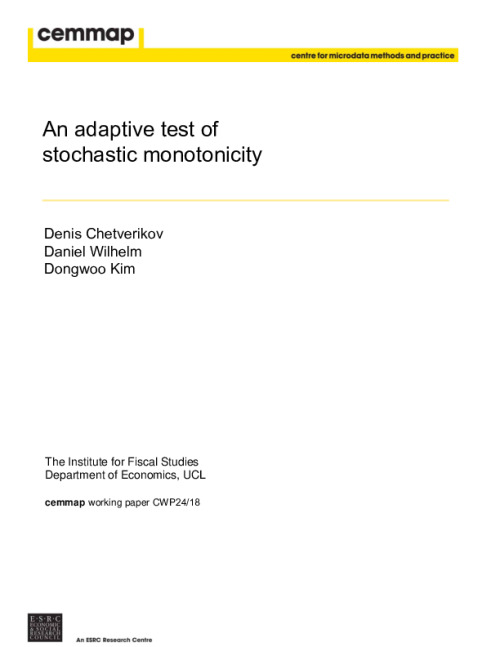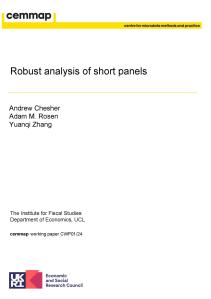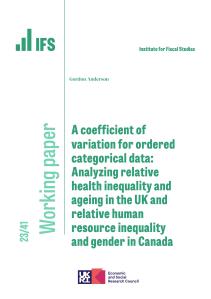Downloads

CWP241818.pdf
PDF | 460.08 KB
We propose a new nonparametric test of stochastic monotonicity which adapts to the unknown smoothness of the conditional distribution of interest, possesses desirable asymptotic properties, is conceptually easy to implement, and computationally attractive. In particular, we show that the test asymptotically controls size at a polynomial rate, is non-conservative, and detects local alternatives that converge to the null with the fastest possible rate. Our test is based on a data-driven bandwidth value and the critical value for the test takes this randomness into account. Monte Carlo simulations indicate that the test performs well in fi nite samples. In particular, the simulations show that the test controls size and may be signi ficantly more powerful than existing alternative procedures.
Authors

Research Associate LMU Munich
Daniel is a Research Associate of the IFS in Cemmap and Professor of Statistics and Econometrics at LMU Munich.

UCLA

Dongwoo Kim
Working Paper details
- DOI
- 10.1920/wp.cem.2018.2418
- Publisher
- The IFS
Suggested citation
D, Chetverikov and D, Kim and D, Wilhelm. (2018). An adaptive test of stochastic monotonicity. London: The IFS. Available at: https://ifs.org.uk/publications/adaptive-test-stochastic-monotonicity-0 (accessed: 27 April 2024).
More from IFS
Understand this issue

Gender norms, violence and adolescent girls’ trajectories: Evidence from India
24 October 2022

Public investment: what you need to know
25 April 2024

The £600 billion problem awaiting the next government
25 April 2024
Policy analysis

ABC of SV: Limited Information Likelihood Inference in Stochastic Volatility Jump-Diffusion Models
We develop novel methods for estimation and filtering of continuous-time models with stochastic volatility and jumps using so-called Approximate Bayesian Compu- tation which build likelihoods based on limited information.
12 August 2014

Assessing the economic benefits of education: reconciling microeconomic and macroeconomic approaches
This CAYT report discusses the strengths and limitations of several approaches to assessing the effect of education on productivity.
14 March 2013

Misreported schooling, multiple measures and returns to educational qualifications
We provide a number of contributions of policy, practical and methodological interest to the study of the returns to educational qualifications in the presence of misreporting.
1 February 2012
Academic research

Understanding Society: minimising selection biases in data collection using mobile apps
2 February 2024

Robust analysis of short panels
8 January 2024

A coefficient of variation for ordered categorical data: Analyzing relative health inequality and ageing in the UK and relative human resource inequality and gender in Canada
21 December 2023